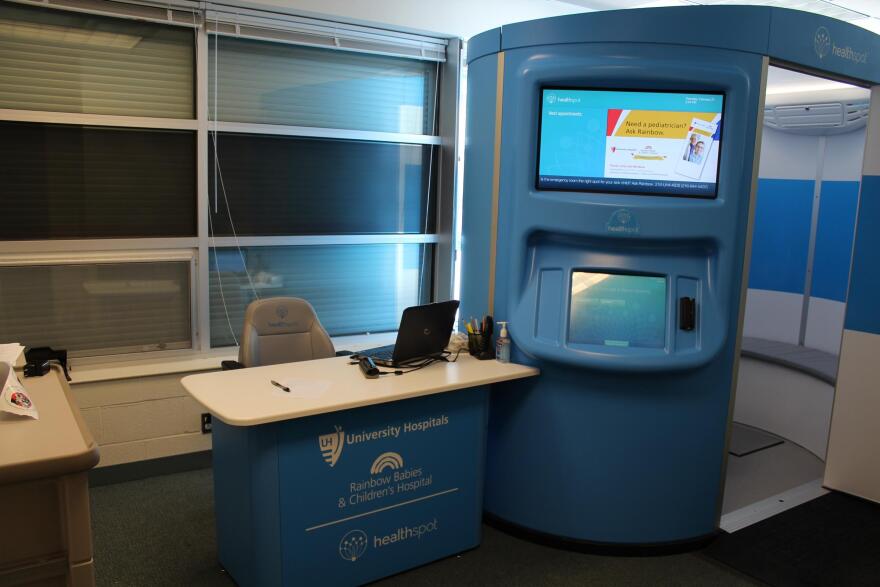There was a time when you got sick, you waited to see the family physician.
But then came the "Doc In A Box" clinics, where you went without an appointment, at night and on weekends. And it only got easier when mini-clinics began popping up in neighborhood pharmacies.
Well, these convenient medical visits are taking the next step. Clinic "kiosks" will soon be connecting Floridians and physicians via video screens and interactive tools.
Guidewell, the parent company for Florida Blue health insurance, carted out products it expects to become part of Florida's health care future, at the MediFuture conference in Tampa. One set to arrive in a just few months is a ready-made, ultra-mini clinic that connects patients and doctors via live video stream.
The clinic is called HealthSpot, and it's got a photo booth feel to it. But inside, it's more like a souped-up version of those blood pressure check machines you see in local pharmacies.
Step inside the nine-foot-by seven-foot booth, close the door and use tethered thermometers, stethoscopes and other devices to transmit health information to the doctor, explained Lisa Maughan, HealthSpot's vice president of marketing.

Computer prompts and even the doctor on a video screen walk the patient through the steps of the checkup. And a trained medical assistant is always working just outside the pod in case you need help, Maughan said.
“And after you take all the vitals that we’re going to connect with our doctor,” she said as the demo doctor appears on the video screen.
“Welcome to the HealthSpot, I’m Dr. Robert Stone,” it says. “I understand you are here for fever and an earache. In a moment I’m going to drop the door so I can use an otoscope to take a look in your ear.”
The state's first HealthSpot should open for business later this year in South Florida, as part of the telemedicine program with Miami Children's Hospital. It's also a concept Guidewell expects to introduce for consumers with Florida Blue insurance policies, says Renee Finley, the vice president for Enterprise Innovation. Finley says it makes financial sense.
“We’re looking for ways to decrease the cost of care delivery. That’s critical. We want to expand access but we know that we also have to decrease cost,” she said. “So solutions like the pod allow us to offer a retail clinic at probably one-tenth of the cost of a mobile retail clinic.”
Ann Mond Johnson, a healthcare technology veteran and chairman of Chicago's ConnectedHealth, was among the hundreds who toured the Guidewell exhibit. She says the mini-clinic hits at the core of what health care will be.
“ I think what’s important to remember about what consumers are going to envision is not necessarily the specifics of what Guidewell is offering,” she said, “but more of the general themes of: ‘Make it easy for me, make it convenient, make it seemless.’ ”
Consumer convenience is the key, says Lindsey Jarrell, a principal and health care advisor at Price Waterhouse Coopers. Expect these clinics and other similar technology showing up in unlikely spots soon, he said.
“I do think we are going to being seeing health care delivered in places like grocery stores and other locations where you might not expect it,” said Jarrell, who is based in Tampa. “I think you're going to see a lot more of that in the next five to 10 years."

Jarrell says there will be glitches with something so new, and that involves the transmission of personal data. That's why he says baby boomers may be more reluctant than millennials to try it out.
“That self-service feeling is going to play better to some populations than to others," he said.
That’s why he offers this advice: don't think this latest convenient clinic -- or any other new technology -- is the end all and be all. Something newer, faster and more convenient is on its way.
--Health News Florida is part of WUSF Public Media. Contact Editor Mary Shedden at (813) 974-8636, on Twitter @MaryShedden, or email at shedden@wusf.org. For more health news, visit HealthNewsFlorida.org.





